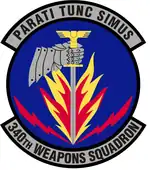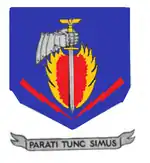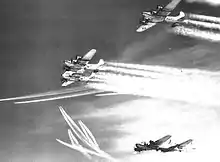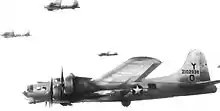340th Weapons Squadron
The 340th Weapons Squadron is a United States Air Force unit assigned to the USAF Weapons School. It is stationed at Barksdale Air Force Base, Louisiana. The 340th is assigned to the 57th Wing, at Nellis Air Force Base, Nevada. The mission of the squadron is to provide Boeing B-52 Stratofortress instructional flying.
340th Weapons Squadron
 | |
|---|---|
 Boeing B-52 taking off from Barksdale AFB | |
| Active | 1942-1945; 1946-1992; 2003-present |
| Country | |
| Branch | |
| Type | Squadron |
| Role | Advanced B-52 Stratofortress Training |
| Part of | Air Combat Command |
| Garrison/HQ | Barksdale Air Force Base, Louisiana |
| Motto(s) | Parati Tunc Simus (Latin for 'Let Us Then Be Prepared')[1] |
| Engagements | World War II
1991 Gulf War (Defense of Saudi Arabia; Liberation of Kuwait)[1] |
| Decorations | Distinguished Unit Citation (2x) Air Force Outstanding Unit Award (7x) |
| Insignia | |
| 340th Weapons Squadron emblem[lower-alpha 1][1] |  |
| 340th Bombardment Squadron emblem[lower-alpha 2][2] |  |
| 340th Bombardment Squadron emblem (World War II)[3] |  |
The squadron was activated on as the 340th Bombardment Squadron. a Boeing B-17 Flying Fortress squadron, assigned to the 97th Bombardment Group. After brief training in the United States with Boeing B-17 Flying Fortress aircraft, it was one of the first heavy bomber squadrons to deploy to the European Theater of Operations. At the end of the year, following Operation Torch, the invasion of North Africa, it participated in the strategic bombing campaign against Germany from the Mediterranean Theater of Operations. It earned two Distinguished Unit Citations for its actions. Following V-E Day, it was inactivated in Italy.
The squadron was again activated as an element of Strategic Air Command in 1946. It flew a series of Boeing bombers in the strategic deterrent role until inactivating. During the Vietnam War, B-52 crews from the squadron participated in the Linebacker offensives over the skies of North Vietnam. In August 1990 the 340th deployed aircrews for Operation Desert Storm.
History
Organization and training
The squadron was activated at MacDill Field, Florida in February 1942 as the 340th Bombardment Squadron, one of the original squadrons of the 97th Bombardment Group.[1][4] The following month, it moved to Sarasota Army Air Field, Florida, where it trained with Boeing B-17 Flying Fortress aircraft and also flew antisubmarine patrols. After a brief training period the squadron left Sarasota on 16 May.[1]
The ground echelon sailed on the RMS Queen Elizabeth, arriving in Scotland on 10 June and at RAF Polebrook two days later. The air echelon, along with the air echelon of the 341st Bombardment Squadron staged through Dow Field, Maine starting on 15 May. From 2 through 11 June the squadrons deployed elements to the Pacific Coast, recommencing their deployment to Great Britain via Goose Bay Airport, Labrador and Greenland to Prestwick Airport Scotland on 23 June. The squadron's B-17s began arriving at Polebrook on 1 July, where they formed part of the first heavy bomber group assigned to Eighth Air Force.[5]
Operations from Great Britain

The haste with which the squadron had trained and deployed resulted in deficiencies in its training. Most pilots had not flown at high altitudes on oxygen; some gunners had never operated a turret, much less fired at a moving target. Crews had flown together for only a few weeks in training. The squadron's first weeks in England were devoted to intensive training, with numerous specialists attending Royal Air Force (RAF) schools to prepare for combat.[6] The squadron flew its first mission on 17 August 1942, attacking a marshalling yard at Rouen, which was also the first mission flown by AAF heavy bombers stationed in Great Britain. Two days later, the squadron supported Operation Jubilee, the raid on Dieppe, by attacking Abbeville/Drucat Airfield.[7] It attacked naval installations, airfields and industrial and transportation targets in France and the Low Countries.[4]
In September, the 97th Group and its squadrons were transferred to XII Bomber Command in the preparations for Operation Torch, the invasion of North Africa. However, VIII Bomber Command retained operational control of these units until they left England.[5] The first AAF bomber groups to deploy to England had patterned their basing on that of the RAF Bomber Command, which typically had a wing with two bomber squadrons on a station.[8] The 97th Group's 342nd and 414th Squadrons were at RAF Grafton Underwood, while 97th Group headquarters, the 340th and the 341st Squadrons were at Polebrook. In September, the AAF decided to follow its own organization and use larger bases that would accommodate an entire group, and the 414th and 342nd Squadrons joined the rest of the group at Polebrook.[1][4][8]
Operations in the Mediterranean Theater

Following the Operation Torch landings at Oran and Algiers on 8 November, the air echelon of the 340th left Polebrook on 18 November, staging through RAF Hurn for Maison Blanche Airport, Algeria. The ground echelon sailed by convoy to Algeria. The squadron was established at Tafaraoui Airfield, Algeria near the end of November.[4][5]
Through May 1943, the squadron engaged in the campaign to cut German supply lines in North Africa by striking shipping in the Mediterranean Sea and bombing docks, harbors, airfields and marshalling yards in North Africa, Sardinia, Sicily and southern France and Italy. The squadron moved forward through Algeria and into Tunisia during these operations. In June 1943, it supported Operation Corkscrew, the projected invasion of Pantelleria, which resulted in the surrender of the island without invasion. Through the summer of 1943, it supported Operation Husky, the invasion of Sicily, and Operation Avalanche, the invasion of Italy.[4]
From November 1943, the squadron was primarily involved with the strategic bombing campaign against Germany.[4] The following month, it moved to Italy, pausing at Cerignola Airfield for a month before moving to Amendola Airfield, which would be its station for the remainder of the war.[1] It bombed targets in Austria, Bulgaria, Czechoslovakia, Germany, Greece, Hungary, Romania, and Yugoslavia; striking strategic targets such as oil refineries, aircraft factories and marshalling yards. During Big Week, the intensive attacks on the German aircraft industry in February 1944, it was part of the lead formation on a strike on an aircraft manufacturing plant at Steyr, Austria, for which it was awarded its first Distinguished Unit Citation. It received a second DUC for an attack on the oil refineries near Ploesti, Romania on 18 August 1944.[4]
The group also flew air support and interdiction missions against enemy lines of communication, airfields and transportation facilities. It supported Allied forces at Anzio and Monte Cassino. It supported Operation Dragoon, the invasion of southern France, with attacks on coastal defenses. In the spring of 1945, it supported United States Fifth Army and British Eighth Army in their advance through the Po Valley.[4]
Following V-E Day, the squadron moved to Marcianise Airfield, Italy, where it was inactivated on 29 October 1945.[1]
Cold War
Reactivated at Smoky Hill Army Air Field, Kansas in August 1946 under Strategic Air Command (SAC), taking over the personnel and equipment of the 828th Bombardment Squadron, which was inactivated. Equipped with Boeing B-29 Superfortresses and participated in numerous exercises, operational readiness inspections, and overseas deployments. Became part of SAC nuclear deterrent force. Began upgrading to the new Boeing B-50 Superfortress, an advanced version of the B-29 in 1949. The B-50 gave the unit the capability to carry heavy loads of conventional weapons faster and farther as well as being designed for atomic bomb missions if necessary.
By 1951, the emergence of MiG-15 interceptor in the skies of North Korea signaled the end of the propeller-driven B-50 as a first-line strategic bomber. Received Boeing B-47 Stratojet jet bombers in 1955 and despite initial difficulties, the Stratojet became the mainstay of the medium-bombing strength of SAC all throughout the 1950s, deployed frequently to North Africa and England for Operation Reflex exercises. Began sending its B-47s to AMARC at Davis-Monthan in 1959 when the aircraft was deemed no longer capable of penetrating Soviet airspace.
Moved to Blytheville Air Force Base, Arkansas and equipped with Boeing B-52G Stratofortress strategic bombers in 1960. Stood nuclear alert with the B-52G, although deployed aircrew to forward bases in the Western Pacific during the Vietnam War which flew Operation Arc Light and Linebacker I combat missions over Indochina; aircrews participated in the December 1972/January 1973 Linebacker II missions over the Hanoi-Haiphong area of North Vietnam. On 15 August 1973, after months of committing most of the wing's people and resources to the conflict, crew E-21 had the distinction of flying the last B-52 mission over a target in Cambodia. This marked the end of the United States' strategic bombing in Southeast Asia. Crews returned to the United States to training and alert status.
Deployed aircraft and crews to the 806th Bombardment Wing (Provisional) at RAF Fairford, England in February 1991, engaging in combat operations over Iraq and Kuwait during Operation Desert Storm. Inactivated in early 1992 after the end of the Cold War.
Bomber training
The Air Force Chief of Staff directed the creation of the 'B-52 Division, USAF Weapons School' on 1 October 1989 as the Strategic Weapons School, graduating the first class in April 1990. In 1992, with the activation of Air Combat Command, the B-52 Division was reborn as part of the USAF Weapons School, eventually becoming Detachment 2, USAF Weapons School. The 340th Bombardment Squadron was reactivated as the 340th Weapons Squadron, USAF Weapons School on 3 February 2003, replacing the detachment.
Lineage
- Constituted as the 340th Bombardment Squadron (Heavy) on 28 January 1942
- Activated on 3 February 1942
- Redesignated 340th Bombardment Squadron, Heavy on 6 March 1944
- Inactivated on 29 October 1945
- Redesignated 340th Bombardment Squadron, Very Heavy on 15 July 1946
- Activated on 4 August 1946
- Redesignated 340th Bombardment Squadron, Medium on 28 May 1948
- Redesignated 340th Bombardment Squadron, Heavy on 1 October 1959
- Redesignated 340th Bomb Squadron on 1 September 1991
- Inactivated on 7 January 1992
- Redesignated 340th Weapons Squadron on 24 January 2003
- Activated on 3 February 2003[1]
Assignments
- 97th Bombardment Group, 3 February 1942 – 29 October 1945
- 97th Bombardment Group, 4 August 1946 (attached to 97th Bombardment Wing after 10 February 1951)
- 97th Bombardment Wing, 16 June 1952
- 97th Operations Group, 1 September 1991 – 7 January 1992
- USAF Weapons School, 3 February 2003 – present[1]
Stations
- MacDill Field, Florida, 3 February 1942
- Sarasota Army Air Field, Florida, 29 March–16 May 1942
- RAF Polebrook (AAF-110),[9] England, 11 June–10 November 1942
- Maison Blanche Airport, Algiers, Algeria, c. 13 November 1942
- Tafaraoui Airfield, Algeria, c. 22 November 1942
- Biskra Airfield, Algeria, 26 December 1942
- Chateau-dun-du-Rhumel Airfield, Algeria, 8 February 1943
- Pont du Fahs Airfield, Tunisia, 12 August 1943
- Depienne Airfield, Tunisia, 14 August 1943
- Cerignola Airfield, Italy, c. 14 December 1943
- Amendola Airfield, Italy, 17 January 1944
- Marcianise Airfield, Italy, c. October–29 October 1945
- Smoky Hill Army Air Field, Kansas, 4 August 1946 (deployed to Mile 26 Airfield (later, Eielson Air Force Base), Alaska, 4 November 1947 – 12 March 1948
- Biggs Air Force Base, Texas, 17 May 1948 (deployed to RAF Lakenheath, England, 5 March–4 June 1952; Andersen Air Force Base, Guam, 16 December 1953 – c. 15 Mar 1954; RAF Upper Heyford, England, 5 May–4 July 1956; Eielson Air Force Base, Alaska, 24 September – 2 November 1957)
- Detachments at RAF Lakenheath, England, and Yokota Air Base, Japan, April 1954 – 1 April 1955
- Blytheville Air Force Base (later Eaker Air Force Base), Arkansas, 1 July 1959 – 7 January 1992
- Barksdale Air Force Base, Louisiana, 3 February 2003 – present[10]
Aircraft
- Boeing B-17 Flying Fortress, 1942–1945
- Boeing B-29 Superfortress, 1946–1950
- Boeing B-50 Superfortress, 1950–1954
- Boeing KB-29 Superfortress, 1954–1955
- Boeing ERB-29 Superfortress, 1954–1955
- Boeing RB-50 Superfortress, 1954–1955
- Boeing B-47 Stratojet, 1955–1959
- Boeing B-52 Stratofortress, 1960–1991[1]
See also
References
Notes
- Explanatory notes
- Modified from emblem approved on 16 March 1956.
- Approved 16 March 1956. Description: On an Air Force blue shield, an armored hand proper, hilt and pommel Air Force yellow, through a stylized bolt of fire, center red, flames of the third [color mentioned], all between two red lighting flashes radiating in base.
- The aircraft closest to the camera, Boeing B-17G-60-BO Flying Fortress, serial 42-102938, Mouse (later Elaine P) was lost in a collision with B-17G 44-8406 while landing at Amendola on 2 January 1945. Baugher, Joe (19 January 2023). "1942 USAF Serial Numbers". Joe Baugher. Retrieved 29 March 2023.
- Citations
- Bailey, Carl E. (22 August 2008). "Factsheet 340 Weapons Squadron (ACC)". Air Force Historical Research Agency. Retrieved 20 December 2016.
- Maurer, Combat Squadrons, p. 421
- Watkins, pp. 72-73
- Maurer, Combat Units, pp. 166-168
- Freeman,p. 246
- Freeman, p. 11
- Freeman, p. 16
- Anderson, p. 5
- Station number in Anderson, p. 20.
- Station information in Bailey, Factsheet, except as noted
Bibliography
![]() This article incorporates public domain material from the Air Force Historical Research Agency.
This article incorporates public domain material from the Air Force Historical Research Agency.
- Anderson, Capt. Barry (1985). Army Air Forces Stations: A Guide to the Stations Where U.S. Army Air Forces Personnel Served in the United Kingdom During World War II (PDF). Maxwell AFB, AL: Research Division, USAF Historical Research Center. Retrieved 1 March 2021.
- Freeman, Roger A. (1970). The Mighty Eighth: Units, Men and Machines (A History of the US 8th Army Air Force). London, England, UK: Macdonald and Company. ISBN 978-0-87938-638-2.
- Maurer, Maurer, ed. (1983) [1961]. Air Force Combat Units of World War II (PDF) (reprint ed.). Washington, DC: Office of Air Force History. ISBN 0-912799-02-1. LCCN 61060979. Retrieved 17 December 2016.
- Maurer, Maurer, ed. (1982) [1969]. Combat Squadrons of the Air Force, World War II (PDF) (reprint ed.). Washington, DC: Office of Air Force History. ISBN 0-405-12194-6. LCCN 70605402. OCLC 72556. Retrieved 17 December 2016.
- Ravenstein, Charles A. (1984). Air Force Combat Wings, Lineage & Honors Histories 1947-1977. Washington, DC: Office of Air Force History. ISBN 0-912799-12-9. Retrieved 17 December 2016.
- Watkins, Robert A. (2009). Insignia and Aircraft Markings of the U.S. Army Air Force In World War II. Vol. IV, European-African-Middle Eastern Theater of Operations. Atglen,PA: Shiffer Publishing, Ltd. ISBN 978-0-7643-3401-6.
